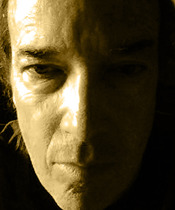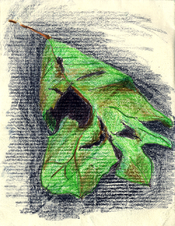Self-taught visionary artist. Painted every sunset for 11 years through 2016. Bio here. William Van Doren art also on Facebook and Instagram, and art prints on Pixels.com/Fine Art America. Author of the non-holiday book 47 Minutes on Christmas Eve. Coming in 2019, Into the Sunset: Paintings and Notes from 4,000 Nights.
VAN DOREN ON THE SUNSET SERIES
SUNSET SLIDESHOWS
Copyright © 2016 William Theodore Van Doren. All rights reserved. Reproduction in whole or in part without permission is prohibited.





 View Printer Friendly Version
View Printer Friendly Version
The Gates Affair: A Code of Control?
We can do this the easy way, or we can do this the hard way.
To paraphrase the great Ernie Banks: Let’s do both!
The Easy Way
I could sum it up, more or less, with a reader comment on a Stanley Fish blog in The New York Times. (Do you hate online reader comments? I sort of do. Luckily, Laura found this.)
Reader ‘Artie’ addressed his comment to reader ‘Ted’:
There you go. Thanks, Artie. But there’s more ...
The Hard Way
Yes, I’m about to compare the celebrated arrest of Henry Louis Gates for disorderly conduct, in Cambridge, Massachusetts, in 2009, with a routine traffic ticket, for failure to yield to an emergency vehicle, given to William T. Van Doren, in Charlottesville, Virginia, in 2007.
What makes the comparison of the two incidents so good is how little they have in common. They have perhaps only one thing in common.
The equation could hardly be better.
On one side, Henry Louis Gates, ‘black’ man, divided by ‘white’ police, Sergeant Crowley.
On the other: Bill Van Doren, ‘white’ man, divided by ‘black’ police, Officer Rollins (not his real name).
Races cancel out.
Before I go further, of course, race is huge in evaluating the Gates matter; I couldn’t even begin to minimize it. But what I suggest is that just because racial perceptions are overwhelming in their ability to influence a situation – and in the case of Gates, cause it to happen in the first place – it doesn’t follow that they are absolutely the underlying factor. They have fantastic power to inflame a situation. But if I experienced something in common with Dr. Gates, then maybe there is also something else going on that race, in his case, aggravated.
I’ll make my story as brief as I can. In January 2007 I got pulled over for not getting out of the way of a fire truck. As borne out in traffic court, where I represented myself, the officer made a poor, or at best iffy, judgment call. I was already entering a green-lighted intersection with a car following behind me when a siren sounded. From my point of view, the source was not visible, and there was that split second of near panic, when to stop seemed to mean getting hit from the rear, when I couldn’t even be sure where the siren came from but it didn’t seem to be imminent, and I just wanted to get the hell out of the way of whatever might be coming. I promptly crossed the intersection. As I did, I saw the fire truck approaching some 70 to 100 yards up the street to my right.
From the start, Officer Rollins operated on assumptions that I will mention just to set the scene, even though they aren’t what this is all about – and in fact, even whether I was really right or wrong has nothing to do with this except as my perceptions may help to paint the scene.
And it would be a lot to ask of any readers to have to believe my side of a traffic dispute for the sake of the larger point.
When a police car followed behind me with lights and siren on, ironically, at first I pulled over to let it by – I didn’t think it was about me. When I realized it was about me, and had to be about the fire truck, I was upset, so that’s the frame of mind in which I started: Oh crap. You gotta be kidding. At no point in the episode was I excited, my attitude was more a weary frustrated protestation.
Officer Rollins was short and, somehow, even though in uniform, conspicuously muscular. His movements were block-like and bristly. When I said I was trying to get out of the way of the engine, he responded, “You gunned it! Sir, you gunned it!” (More about ‘sir’ perhaps in a later post.)
Clearly, his mind was made up that I had ‘gunned it’ across Main Street in order not to be inconvenienced by having to wait for an emergency vehicle – so I could get on my merry way. (At least I really don’t think he believed I was showing off my 4-cylinder 1998 Honda CR-V with 200,000 miles ... a stick-shift AWD, with low torque in first gear, so ... I gunned it.) Nothing I said made any impression.
But the main point of contention was my statement that I couldn’t see where the truck was. I had been at the south side of the light, and he had been in traffic 90° to my left, in the cross street, on the west side. For reasons far too detailed to explain but having to do with other cars and especially the curve of the streets, I couldn’t see anything up to my right, while he had an oncoming view. I had of course looked around to see if I could see anything, but nothing.
His firm conclusion: “You saw the vehicle. I saw you look!” (This got repeated a few times.)
Nothing I said about how I looked but couldn’t see made any difference. As he turned back toward his car – with my license and registration in his hand – to my amazement, he actually warned me not to drive off.
I replied, not heatedly – the weary frustration was setting in – “I’m not going anywhere.”
But Officer Rollins apparently didn't catch what I said.
He wheeled around and charged back to my window, actually yelling, “WHAT DID YOU SAY!?”
I felt like Mike Piazza at the plate facing hyped-up Roger Clemens. It was difficult to believe that this man’s job must involve stopping drivers every day, who must often be more upset than I was – wasn’t it part of his profession to try not to become even more emotional than the driver?
(At this point I might interject that it’s possible my experience wasn’t exactly race-neutral, either. ‘White’ people in this part of Virginia face resentment that is very well earned, and not just from olden days. A term I use, ‘Jeffersonian racism’, is perhaps not completely fair to its namesake, but it describes a particularly vicious form of prejudice that is covert and cloaked in wonderful manners. In a sense it’s worse than Alabama and Mississippi and George Wallace standing in the schoolhouse door. The Virginia gentleman’s racism is so ... genteel, so ... distinguished, so outwardly ‘intelligent’. With my beat-up car, and out grocery shopping on a Tuesday morning, I may have struck him not as the freelancing fool that I was but as one more of these Charlottesville folks nursing a trust fund. And what I thought of as aggrieved he may have heard as entitled.)
So I come back to Artie’s point, and to the experience of Henry Louis Gates. Disorderly conduct could consist essentially in a charge of being Angry At A Police Officer. I was upset enough, from this really small matter. It’s truly impossible for me to imagine being Dr. Gates and feeling like I was somehow profiled at my own home. Emotions could rule – of course. In that situation, who’s the professional peacekeeper? Who’s carrying deadly force? Who’s supposed to know how to keep things from getting ridiculous?
What the ultimately outrageous, racially fraught arrest of Henry Louis Gates and the measly stupid little traffic stop of Bill Van Doren have in common may be an implication that we are required, I suspect increasingly, to comply with, and even meet the detailed behavioral expectations of, a basically military form of conduct – a code of control.
The code of control makes few allowances for the realities of humanity.
Some accounts of the Gates story have suggested that everything depends on the flexibility and tolerance of the responding officer. That’s true as far as it goes. But it’s only true because the officers act within a framework that demands, potentially, nearly complete submission, that assumes the superiority not so much of the law but of the law enforcers.
Perhaps we have 9/11 to thank; perhaps the deliberately and in many ways cynically engineered response tipped a balance in American life. In the case of Henry Louis Gates, it could be that the responding officer acted essentially without prejudice. It’s possible he acted as he did because the emotional response of Dr. Gates to a figure of authority is not acceptable in the United States of America.
UPDATE (originally added the next day):
There were a few things I had intended to include in yesterday’s post that just didn’t fit, plus I believe I should clarify an item or two.
The topic is so charged, and I worried that people could misconstrue certain things, that I hadn’t explained myself quite as well as I might have, etc., etc., plus – plus! – with some stitches on the right side of my face, thanks to a recent assault by a dermatologist, I could sleep only on one side.
I woke up sort of whining to Laura about how I’d been thinking about all these things in my post and I wished I could just turn over on my other side for a while.
“My head’s like a beanbag with all the beans on one side,” I whined.
And then the blogger’s pathetic lament:
“It’s not fair to expect someone with a beanbag brain to be able to write stuff.”
* * * *
But I did, so here are a few notes. The most important thing I want to emphasize is that I do not compare my experience with that of Dr. Gates; the two do not compare, nohow, no way. My purpose is only to isolate a common denominator in the situations, even though I can probably never begin to know what his felt like.
The other clarification would be that, naturally, I realize that police did not suddenly start acting this way after 9/11 – they have perhaps been like this from time immemorial. My meaning is that I sense there’s been a certain spread of these essentially military-based behavioral expectations in our culture, in this period.
There was one incident I had wanted to include in my story, but it seemed not quite essential. Earlier this year I had the experience of taking Flint out for a run, off leash through the woods, and running into a guy setting coyote traps on the adjacent property. There’s no fence between the properties at that point, so it was incredibly lucky for us that we happened to be out when he was there, to learn that the traps were being set.
Flint (the pound-found foxhound) does not obey our every command, or does so selectively, according to the urgency of other stimuli, such as a stranger in the woods.
Long story short, coyote guy was a member of the U.S. Army (an Army intelligence installation is our neighbor on the other side) and this was his freelance gig. Even though he did not own the property he was working on, and did not know me, and my feet had not strayed from the property where we rent, his attitude when I hailed him was just one notch shy of physical aggression. His demeanor, his speech, his robotic way of moving, were strikingly reminiscent of Officer Rollins. I guess I should mention that the fellow was ‘white.’
On the positive side, he was concerned that Flint not get into a coyote trap. But his way of looking at that situation was entirely through the military-style prism:
“Sir, you need to get control of your animal.”
I could write three more paragraphs deconstructing that statement and its implications. Do I need to?
* * * *
Thanks to Laura for this. I don’t know when authorities started routinely addressing everyone as ‘Sir’ and ‘Ma’am’, but if it was intended to establish a certain basic respect, it isn’t working. It’s become virtually threatening in its connotation – it conveys a warning. It immediately establishes you as the inferior party in the transaction. Maybe these people should try just starting with “Hello” – if they can handle it.
* * * *
Finally, the thing I most regret not being able to fit into my little essay was how much I loved the Henry Louis Gates series, African American Lives. What a misleadingly dull title for such a great show. It doesn’t matter what ethnicity you are, the series is fascinating, entertaining, moving and illuminating. I’ve now got African American Lives 2 coming in the mail.
One interesting thing about the series, especially in light of all that’s happened, is Dr. Gates as its guide. You can’t help but like this guy – not because he assumes some wonderful TV narrator persona, not because he seems so brilliant, but precisely because he doesn’t try to do any of that. He is who he is ... you see him interact with people in his family, with research librarians, with African American celebrities, and you see his little quirks, you can sense the vulnerability, the little vanities and insecurities we all have. Having gotten to know him from the show, I was literally heartsick when I heard what happened to him.
I do know you’ll like watching, and learning from, Henry Louis Gates, Jr.